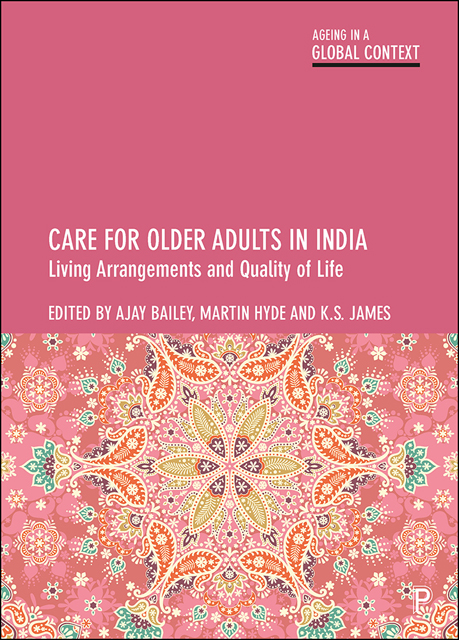Book contents
- Frontmatter
- Contents
- List of figures and tables
- Notes on the editors
- List of contributors
- Acknowledgements
- Series editors’ preface
- Map of India
- 1 Introduction: Living arrangements and care in India
- 2 Theorising care and relationships in the age of migration
- 3 Emerging living arrangements of older adults in India: patterns and welfare implications
- 4 Living arrangement concordance and the well-being of older persons in India
- 5 Family size and living arrangements among older adults in Kerala: panel data analysis, 2004– 19
- 6 Care arrangements for older adults: exploring the intergenerational contract in emigrant households of Goa, India
- 7 All my responsibilities towards my children are over! Linked lives and life course obligations among older adults with migrant children in India
- 8 Interpreting the landscapes of care for older men in Delhi and Kolkata: perspectives from care receivers and caregivers
- 9 The role of cultural meaning system and place attachment in retaining home ownership while residing in retirement homes in Kerala, India
- 10 Decision-making and choice or sine qua non? Care home entry in Tamil Nadu
- 11 Welfare and development programmes for older adults in India
- 12 Lessons and future directions for caregiving research in India
- Index
Series editors’ preface
Published online by Cambridge University Press: 13 October 2022
- Frontmatter
- Contents
- List of figures and tables
- Notes on the editors
- List of contributors
- Acknowledgements
- Series editors’ preface
- Map of India
- 1 Introduction: Living arrangements and care in India
- 2 Theorising care and relationships in the age of migration
- 3 Emerging living arrangements of older adults in India: patterns and welfare implications
- 4 Living arrangement concordance and the well-being of older persons in India
- 5 Family size and living arrangements among older adults in Kerala: panel data analysis, 2004– 19
- 6 Care arrangements for older adults: exploring the intergenerational contract in emigrant households of Goa, India
- 7 All my responsibilities towards my children are over! Linked lives and life course obligations among older adults with migrant children in India
- 8 Interpreting the landscapes of care for older men in Delhi and Kolkata: perspectives from care receivers and caregivers
- 9 The role of cultural meaning system and place attachment in retaining home ownership while residing in retirement homes in Kerala, India
- 10 Decision-making and choice or sine qua non? Care home entry in Tamil Nadu
- 11 Welfare and development programmes for older adults in India
- 12 Lessons and future directions for caregiving research in India
- Index
Summary
As the global older population continues to expand, new issues and concerns arise for consideration by academics, policy makers, and health and social care professionals worldwide. Ageing in a Global Context is a series of books, published by Policy Press in association with the British Society of Gerontology, which aims to influence and transform debates in what has become a fast-moving field in research and policy. The series seeks to achieve this in three main ways: first, through publishing books which rethink the key questions shaping debates in the study of ageing. This has become especially important given the re-structuring of welfare states, alongside the complex nature of population change, both of these elements opening up the need to explore themes which go beyond traditional perspectives in social gerontology. Second, the series represents a response to the impact of globalisation and related processes, these contributing to the erosion of the national boundaries which originally framed the study of ageing. From this has come the emergence of issues explored in various contributions to the series, for example: the impact of cultural diversity, changing patterns of working life, new forms of inequality, the role of ethnicity in later life and related concerns. Third, a key concern of the series is to explore interdisciplinary connections in gerontology. Contributions to the series provide a critical assessment of the disciplinary boundaries and territories influencing later life, creating, in the process, new perspectives and approaches relevant to the twenty-first century.
Given these broad aims, this very comprehensive study of the care of older people in India is to be especially welcomed. The editors are surely right in their assessment of the importance of a better understanding of the Indian context, given both the size of the country's population and also its immense cultural, demographic and social diversity. Indeed, the key conclusion to be drawn from the various chapters is precisely the variety of living arrangements of older adults, set within the continued importance of the traditional family structure within India. The book is of particular importance in the way it draws together a wealth of material, based upon both quantitative and qualitative data, looking at trends across India and individual states.
- Type
- Chapter
- Information
- Care for Older Adults in IndiaLiving Arrangements and Quality of Life, pp. xiii - xivPublisher: Bristol University PressPrint publication year: 2022

